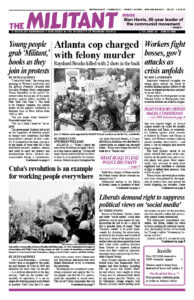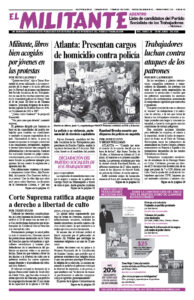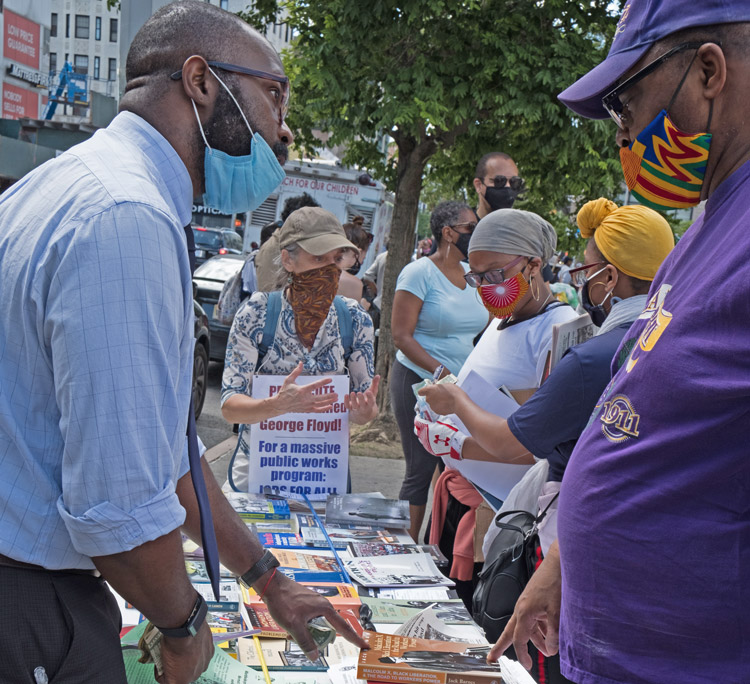“I want that book,” the young man pointing to Women’s Liberation and the African Freedom Struggle told Socialist Workers Party campaigner Tamar Rosenfeld at the party’s literature table during one of the many protests against police brutality in New York City June 7. The book is by Thomas Sankara, the central leader of the popular revolution in Burkina Faso in West Africa from 1983 to 1987.
“Do you know about Sankara?” Rosenfeld asked him.
“No, but I think I need to,” he replied.
The government Sankara led acted on the capacities of working people to change their conditions and fight imperialism’s plunder of their country. It nationalized the land, placing it in the hands of those who till it and mobilized peasants, workers, women and youth to carry out literacy and immunization drives. Sankara was assassinated during a counterrevolutionary coup, but his revolutionary course provides a powerful example to those standing up to exploitation and oppression today.

SWP members who have been marching in the actions coast to coast, bringing a working-class perspective on the road forward, have had scores of experiences like this.
Two teenagers came by the same table, Rosenfeld reports, and bought several books, including Che Guevara Talks to Young People. One said she knew little about Guevara, a leader of the Cuban Revolution, but “that’s why I want it.”
“Now I need to buy a bookshelf,” the other added.
“There’s a thirst for books, not only about the Black struggle but on women’s emancipation, the labor movement, revolutionary history,” Willie Cotton, SWP candidate for Congress in the 9th District in Brooklyn, told the Militant. Cotton has joined many of the protests. “We’ve sold over 100 books in New York since June 1.” The book sales went hand in hand with many protesters subscribing to the Militant and taking literature on the SWP campaign.
Many people joining the protests “were attracted to the wide range of literature on our table, with signs that highlight the SWP 2020 election platform, including workers control of production, the need for a labor party, defense of women’s rights, and the need for a fight for amnesty for immigrants,” he said.
Socialist Workers Party members are meeting young people who’ve never been to a protest before outrage exploded over the cop killing of George Floyd. The interest in books by revolutionaries and the Militant is also fueled by the effects of the unfolding capitalist economic crisis and resistance by working people to employer attacks on jobs, wages and working conditions.
Interest in revolutionary literature
Continuing to campaign among working people on their doorsteps from big cities to small towns and rural areas is important to build a truly national working-class movement. Campaigners are also finding more interest among working people whether or not they have joined any of the protests.
“Campaigning in the South Bronx June 15, we sold three subscriptions to the Militant and two books in little over an hour,” reports Brian Williams in New York.
Many of those getting books or the Militant will want to join together in other protest actions, host house meetings for the SWP candidates, join campaigning for the SWP presidential ticket or get together to discuss what they have been reading.
World is ‘very different today’
The campaign tour stop in Kentucky by Alyson Kennedy and Malcolm Jarrett, SWP candidates for president and vice president, showed the opportunities to reach out broadly as well as deepen relations with those who are beginning to know the party. They joined protest actions, campaigned at a Walmart parking lot and talked to workers at their homes to learn about what they face, and introduced the party’s program.
In Central City, two hours southwest of Louisville, Kennedy and Jarrett met Militant subscriber Sherry Webb, who runs a dog-grooming business from her trailer. Webb, who is originally from eastern Kentucky, said that in the 1960s some towns had signs saying “‘If you’re Black, keep on trucking.’ But things are very different today and that’s good.”
A protest in Richmond, Webb’s hometown, was peaceful, she said, “but some of them in other places have been violent. I don’t like that. When mom-and-pop stores get looted, the owners lose their livelihood.”
“We need a disciplined movement led by the working class,” Kennedy said. At many demonstrations, protesters blocked attempts at looting and this has had an impact.
Webb got a copy of The Turn to Industry: Forging a Proletarian Party by Jack Barnes, the national secretary of the SWP. It’s a book about why a revolutionary working-class party recognizes the “worth of working people, and our power to change society when we organize and act against the capitalist class.”
Kennedy and Jarrett took part in a three-mile march of more than 200 people organized by a church in Radcliff, Kentucky, against police killings and racism. Both candidates spoke at the rally.
Tiffany Cooper, a warehouse worker from Louisville, marched with them. “When the truth came out that cops busted in the door and never announced themselves before shooting Breonna Taylor, I was so upset and angry! That’s why I’m here today,” she said.
The victims of police brutality are disproportionately Black. But as more workers resist the bosses’ attempts to make us pay for the capitalist crisis, workers of all skin colors will get a lesson on “what class the cops serve and protect,” Kennedy said, when cops harass strikers on picket lines and at other working-class struggles.
At a rally against police brutality outside Louisville Metro Center June 11, Kennedy and Jarrett met factory worker Defrederic Robards, who was at his seventh protest against cop brutality.
“What’s your strategy for getting well-known like Donald Trump or Bernie Sanders?” he asked Kennedy.
“The kind of party I’m in is comprised of serious fighters who know that the working class is capable of uniting and becoming strong enough to take power,” Kennedy replied. “I was a part of a 10-month-long strike for union representation at a coal mine in Utah several years ago. The bosses thought they could get away with paying workers $5 an hour because most were foreign-born. We didn’t allow the bosses’ intimidation tactics to defeat us. This is an example of the kind of party the SWP is and how we get known.”
“Wow,” Robards replied, adding he appreciated that Kennedy was the only presidential candidate to come to protests against the police killings. He bought a subscription to the Militant and Malcolm X, Black Liberation, and the Road to Workers Power.
At the end of the tour in Kentucky 16 people attended a barbecue, including seven Walmart workers who have been part of a fight against speedup in the store’s online grocery department.
To get involved in the protests, and join in winning new readers to the Militant and books by revolutionary leaders, see the list of distributors.
Maggie Trowe in Louisville, Kentucky, contributed to this article.


